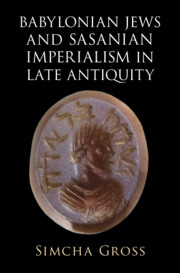Book contents
- Babylonian Jews and Sasanian Imperialism in Late Antiquity
- Babylonian Jews and Sasanian Imperialism in Late Antiquity
- Copyright page
- Contents
- Acknowledgments
- Introduction
- 1 Jewish Society under Sasanian Rule
- 2 Competing for Power
- 3 Beyond ‘Tolerance’
- 4 Forgetting Persecution
- 5 Rabbis and Fire Temples
- 6 Kings and Religion in the Talmud and in the Imagination of Sasanian Communities
- Conclusion
- Bibliography
- General Index
- Source Index
Conclusion
The Sasanian Empire from the Perspective of the Jews
Published online by Cambridge University Press: 04 April 2024
- Babylonian Jews and Sasanian Imperialism in Late Antiquity
- Babylonian Jews and Sasanian Imperialism in Late Antiquity
- Copyright page
- Contents
- Acknowledgments
- Introduction
- 1 Jewish Society under Sasanian Rule
- 2 Competing for Power
- 3 Beyond ‘Tolerance’
- 4 Forgetting Persecution
- 5 Rabbis and Fire Temples
- 6 Kings and Religion in the Talmud and in the Imagination of Sasanian Communities
- Conclusion
- Bibliography
- General Index
- Source Index
Summary
While presiding over a legal dispute, Rav Naḥman’s student persistently pestered him with questions. Exasperated, Rav Naḥman reprimanded the student:
Did I not say to you that when I am sitting in judgment you should not say anything to me, for Huna our colleague said with reference to me that I and King Shapur are brothers in respect of judgement (dina) … ?1
- Type
- Chapter
- Information
- Babylonian Jews and Sasanian Imperialism in Late Antiquity , pp. 272 - 284Publisher: Cambridge University PressPrint publication year: 2024



